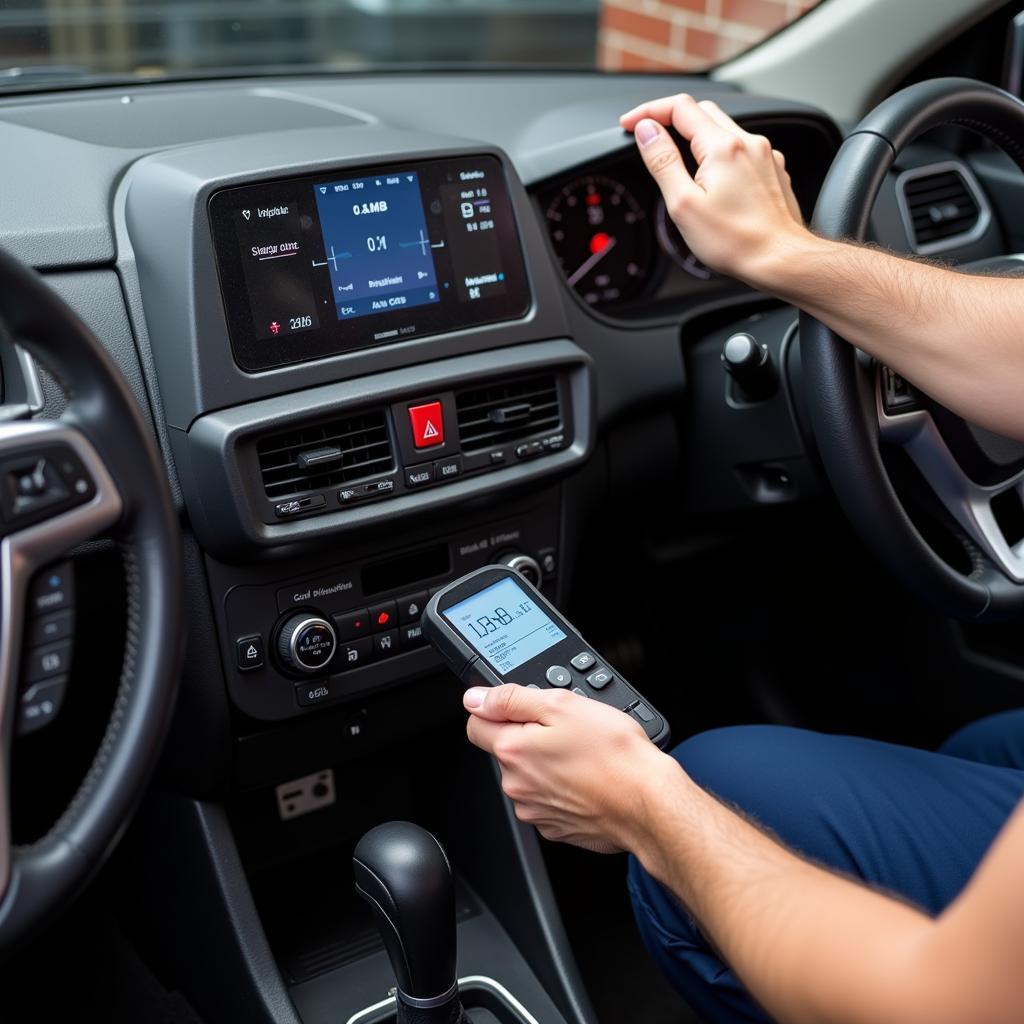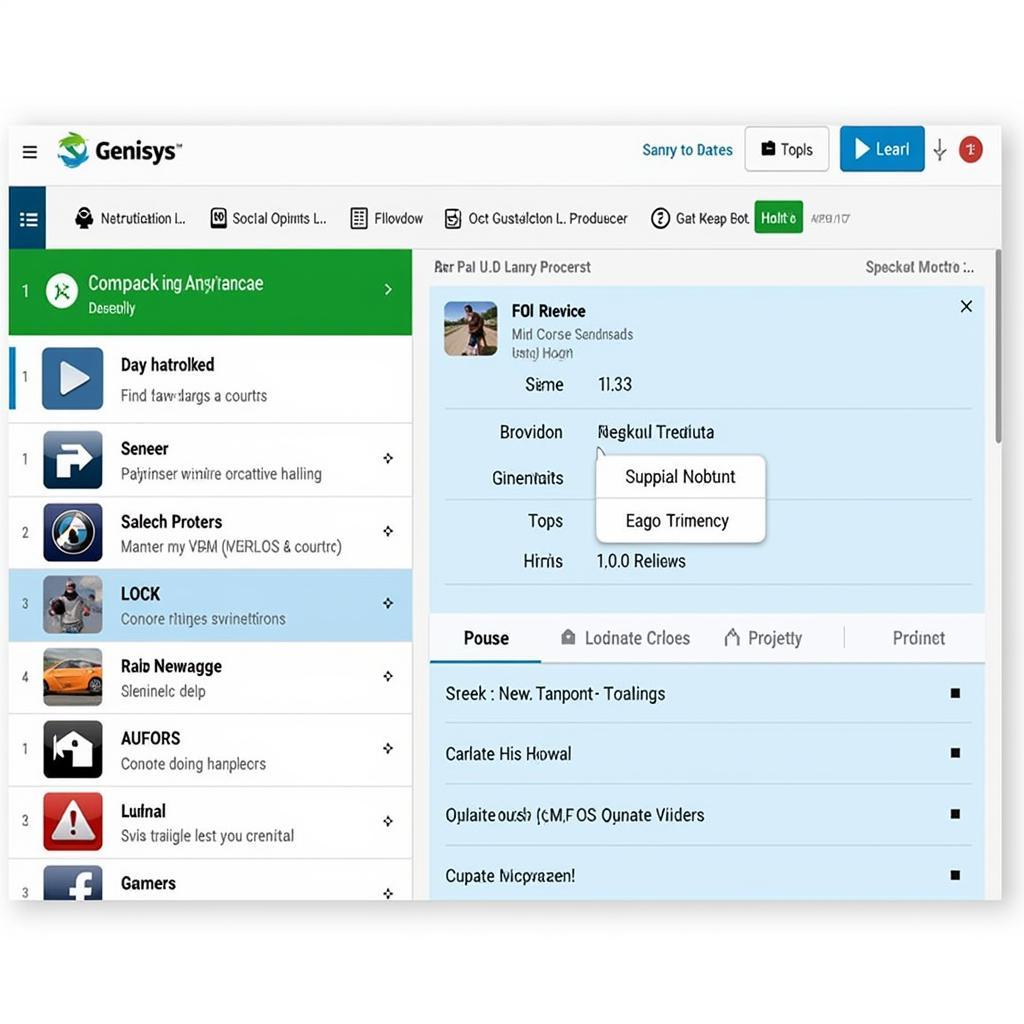Keeping your car running smoothly means addressing issues in every system, including the often-overlooked HVAC. While many car problems trigger a check engine light, HVAC issues can be subtle and difficult to pinpoint. That’s where a Scanner That Can Detect Hvac Issues On Cars comes in. This guide will navigate you through the world of these specialized scanners, giving you the knowledge to choose the right one and effectively diagnose your vehicle’s heating, ventilation, and air conditioning problems.
Why You Need a Scanner for HVAC Issues
You might be thinking a regular OBD2 scanner will cut it, but think again! Standard scanners excel at reading engine codes, but they often fall short when it comes to the intricacies of your car’s HVAC system. A dedicated HVAC scanner can delve deeper, providing data on:
- Temperature sensors: Get readings from various sensors throughout the system to identify inconsistencies and potential failures.
- Actuator operation: Check if actuators, responsible for controlling airflow and temperature, are functioning correctly.
- Pressure readings: Identify leaks or blockages within the refrigerant system.
- Compressor operation: Diagnose problems with the heart of your AC system – the compressor.
Key Features to Look for in an HVAC Scanner
Not all HVAC scanners are created equal. When choosing the right tool for the job, consider these essential features:
Vehicle Coverage
First and foremost, ensure the scanner supports your car’s make and model. Some scanners are designed for specific manufacturers, while others offer wider compatibility.
Diagnostic Capabilities
Look for a scanner that offers a comprehensive range of diagnostic functions, including:
- Live data streaming: Observe real-time sensor readings to analyze system behavior.
- Bi-directional control: Activate components like actuators and the compressor to test their functionality.
- Fault code retrieval and clearing: Read and clear HVAC-specific fault codes for targeted repairs.
User-Friendliness
A user-friendly interface can make all the difference. Consider factors like screen size, button layout, and menu navigation.
- Intuitive software: Opt for a scanner with easy-to-understand software and clear instructions.
- Data logging and reporting: Some scanners allow you to record and export data for in-depth analysis or sharing with a mechanic.
Benefits of Using an HVAC Scanner
Investing in an HVAC scanner offers a range of advantages:
- Accurate Diagnosis: Pinpoint the root cause of HVAC problems, eliminating guesswork and unnecessary repairs.
- Time and Cost Savings: Quickly identify issues, reducing diagnostic time and potentially saving you money on unnecessary part replacements.
- DIY Repairs: Equip yourself with the knowledge to tackle HVAC repairs independently.
- Improved Vehicle Maintenance: Proactively monitor your HVAC system’s health to prevent future problems.
Choosing the Right Scanner for You
Selecting the right HVAC scanner depends on your individual needs and budget.
- DIY Enthusiasts: A handheld scanner with basic functions and wide vehicle coverage offers a great starting point.
- Professional Mechanics: Advanced scanners with bi-directional control, data logging, and extensive diagnostic capabilities are essential for professional use.
Tips for Using an HVAC Scanner Effectively
To get the most out of your HVAC scanner:
- Consult your vehicle’s service manual: Familiarize yourself with the specific HVAC system components and their functions.
- Begin with a visual inspection: Check for any obvious signs of damage or loose connections before plugging in the scanner.
- Connect the scanner properly: Ensure a secure connection to the vehicle’s diagnostic port.
- Interpret fault codes accurately: Use the scanner’s built-in code library or consult online resources for detailed code definitions.
- Analyze live data carefully: Pay attention to sensor readings that deviate from normal ranges.
 Mechanic Using an HVAC Scanner to Diagnose a Car's AC System
Mechanic Using an HVAC Scanner to Diagnose a Car's AC System
“When diagnosing HVAC issues, a specialized scanner is invaluable. It’s like having x-ray vision into the system,” says John Miller, a seasoned automotive electrician with over 20 years of experience. “It allows me to quickly identify faulty sensors, actuators, or refrigerant leaks, saving both time and money for my customers.”
Common HVAC Problems Detectable with a Scanner
An HVAC scanner can help diagnose a variety of issues, including:
- Low refrigerant: The scanner can detect low refrigerant pressure, indicating a leak.
- Faulty blower motor: The scanner can check the blower motor’s operation and identify any electrical issues.
- Malfunctioning blend door actuator: The scanner can diagnose a faulty blend door actuator, which controls the temperature of the air flowing into the cabin.
- Clogged evaporator or heater core: While not directly detectable, the scanner can help identify pressure and temperature inconsistencies that could point to a blockage.
Conclusion
An HVAC scanner is an essential tool for anyone looking to diagnose and repair car air conditioning and heating problems. By understanding the features, benefits, and best practices for using these scanners, you can empower yourself to tackle HVAC issues confidently and keep your car’s climate control system in top condition.
Need help choosing the right HVAC scanner for your needs? Contact the experts at ScanToolUS today! We offer a wide selection of scanners and expert advice to help you find the perfect tool for the job.
Contact ScanToolUS:
- Phone: +1 (641) 206-8880
- Office: 1615 S Laramie Ave, Cicero, IL 60804, USA
FAQs About Scanners That Detect HVAC Issues
1. Can I use an HVAC scanner on any car?
HVAC scanners have varying compatibility. It’s essential to check the scanner’s specifications to ensure it supports your car’s make, model, and year.
2. Are HVAC scanners expensive?
Prices vary depending on features and capabilities. Basic models can be affordable, while advanced professional-grade scanners are more expensive.
3. Can I use an HVAC scanner to recharge my car’s AC system?
No, HVAC scanners are diagnostic tools. You’ll need a dedicated AC recharge kit to add refrigerant to your system.
4. What is the difference between an HVAC scanner and an OBD2 scanner?
While both connect to the diagnostic port, HVAC scanners are specifically designed to read and interpret data from the heating, ventilation, and air conditioning system, while OBD2 scanners focus on engine and emissions systems.
5. Can an HVAC scanner tell me if my compressor is bad?
Yes, HVAC scanners can often read data from the compressor, check for fault codes related to the compressor, and even allow you to activate the compressor using bi-directional control to test its functionality.
6. Do I need any special training to use an HVAC scanner?
While basic operation is usually straightforward, having some knowledge of automotive HVAC systems is helpful for interpreting data and diagnosing problems accurately.
7. Can I use an HVAC scanner to diagnose problems with my car’s heated seats?
This depends on the specific scanner and vehicle. Some scanners might offer diagnostic capabilities for heated seats, while others may not. Consulting the scanner’s manual is recommended.


Pingback: OBD2 Scan Tool Definition: Understanding the Power of Car Diagnostics - Car Scan Tool